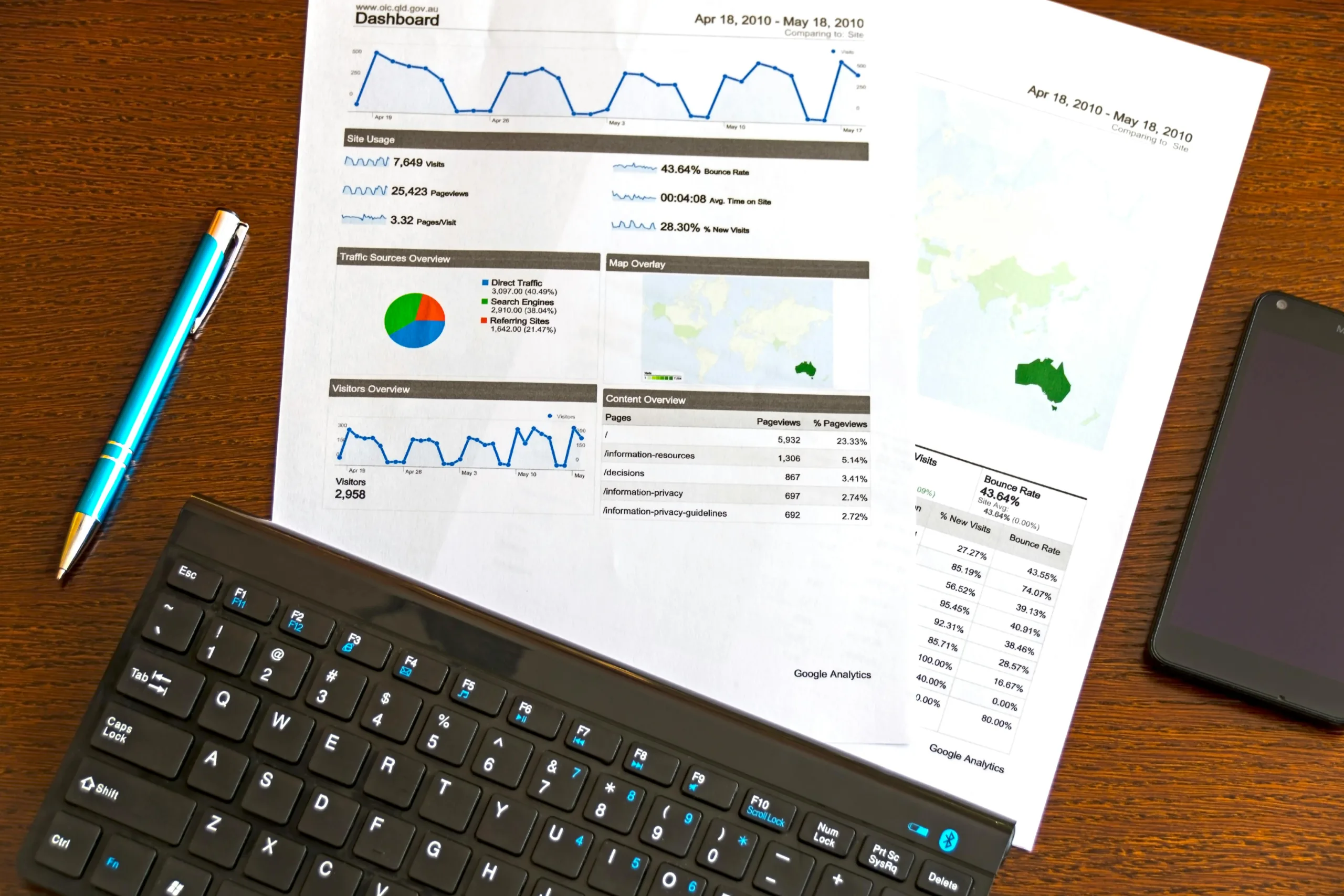Copyright © 2024 - Proudly built and managed by us.

Introduction
In today’s digital age, data has emerged as a valuable asset for businesses worldwide. Harnessing the power of data analytics has become increasingly essential for Ghanaian businesses striving to stay competitive in an ever-evolving market landscape.
Understanding Data Analytics
What is Data Analytics? Data analytics involves the process of examining large datasets to uncover meaningful insights, patterns, and trends. By utilizing various statistical and computational techniques, businesses can extract actionable insights from raw data.
Importance of Data Analytics Data analytics plays a pivotal role in enabling informed decision-making, optimizing operations, and gaining a competitive edge in the marketplace. It empowers organizations to derive value from their data assets and drive business growth.
Benefits of Data Analytics
Enhancing Decision Making Data analytics provides valuable insights that enable businesses to make informed decisions based on data-driven evidence rather than intuition or guesswork. By analyzing historical data and predictive modeling, businesses can anticipate market trends, identify opportunities, and mitigate risks effectively.
Improving Operational Efficiency Efficiently managing resources and processes is crucial for Ghanaian businesses to thrive. Data analytics enables organizations to optimize operations by identifying inefficiencies, streamlining workflows, and allocating resources more effectively. By leveraging predictive analytics, businesses can forecast demand, minimize wastage, and optimize supply chain management.
Personalizing Customer Experiences Understanding customer preferences and behavior is paramount for delivering personalized experiences and fostering customer loyalty. Data analytics allows Ghanaian businesses to analyze customer data, segment audiences, and tailor marketing strategies to individual preferences. By delivering targeted promotions and personalized recommendations, businesses can enhance customer satisfaction and drive repeat business.
Mitigating Risks and Fraud In an increasingly interconnected digital landscape, cybersecurity threats and fraudulent activities pose significant risks to businesses. Data analytics helps detect anomalies and unusual patterns in data, enabling proactive risk management and fraud detection. By leveraging advanced analytics techniques such as anomaly detection and machine learning, organizations can identify potential threats and take preemptive action to safeguard their assets and reputation.
Facilitating Strategic Planning Strategic planning is essential for setting long-term goals and defining the roadmap for achieving them. Data analytics provides valuable insights into market trends, competitive landscapes, and emerging opportunities, enabling informed strategic decision-making. By analyzing historical data and forecasting future trends, Ghanaian businesses can devise actionable strategies to capitalize on market dynamics and stay ahead of the competition.
Empowering Data-Driven Culture Fostering a data-driven culture is key to unlocking the full potential of data analytics within an organization. By promoting data literacy and encouraging cross-functional collaboration, businesses can empower employees to leverage data effectively in their decision-making processes. Investing in training programs and adopting user-friendly analytics tools can further facilitate the adoption of a data-driven mindset across the organization.
Applications of Data Analytics in Ghanaian Business
Agriculture and Food Security Data analytics can revolutionize Ghana’s agricultural sector by optimizing crop yields, predicting weather patterns, and improving supply chain management. By leveraging data analytics, farmers can make informed decisions about planting, harvesting, and irrigation, leading to increased productivity and food security.
Healthcare Management In the healthcare sector, data analytics can enhance patient care, optimize hospital operations, and improve public health outcomes. By analyzing patient data, healthcare providers can identify trends, detect disease outbreaks, and tailor treatment plans to individual needs. Additionally, data analytics can help optimize resource allocation, reduce healthcare costs, and improve overall efficiency.
Financial Services Data analytics has immense potential to transform Ghana’s financial services industry by improving risk management, fraud detection, and customer service. By analyzing transactional data, financial institutions can identify fraudulent activities, mitigate risks, and enhance regulatory compliance. Moreover, data analytics enables banks and financial institutions to offer personalized financial products and services tailored to individual customer needs.
Retail and E-Commerce In the retail sector, data analytics can drive sales growth, optimize inventory management, and enhance customer engagement. By analyzing customer data and purchase patterns, retailers can personalize marketing campaigns, recommend products, and optimize pricing strategies. Additionally, data analytics enables retailers to forecast demand, optimize supply chain logistics, and minimize stockouts, leading to improved customer satisfaction and increased profitability.
Challenges and Solutions
Data Quality and Accessibility One of the primary challenges faced by Ghanaian businesses in adopting data analytics is the quality and accessibility of data. Poor data quality and siloed data sources can hinder the effectiveness of data analytics initiatives. To address this challenge, businesses must invest in data quality management tools, establish data governance frameworks, and integrate disparate data sources to ensure data accuracy and accessibility.
Talent Shortage and Skills Gap Another significant challenge is the shortage of skilled data professionals and the widening skills gap in the workforce. To overcome this challenge, Ghanaian businesses must invest in training and upskilling programs to develop a talent pipeline of data scientists, analysts, and engineers. Additionally, partnering with educational institutions and collaborating with industry experts can help bridge the skills gap and build a robust data analytics workforce.
Regulatory Compliance Data privacy and regulatory compliance are critical considerations for Ghanaian businesses implementing data analytics initiatives. With the introduction of data protection laws such as the Data Protection Act, organizations must ensure compliance with regulatory requirements and data privacy standards. By implementing robust data security measures, encrypting sensitive data, and adhering to regulatory guidelines, businesses can safeguard customer privacy and mitigate legal risks.
Data Security and Privacy Concerns Data security and privacy concerns pose significant challenges to data analytics adoption in Ghanaian businesses. With the increasing volume and complexity of data breaches, organizations must prioritize data security and adopt stringent security measures to protect sensitive information. By implementing encryption, access controls, and monitoring tools, businesses can mitigate data security risks and maintain customer trust.
Case Studies
Successful Implementation of Data Analytics in Ghanaian Businesses Several Ghanaian businesses have successfully leveraged data analytics to drive business growth and innovation. From fintech startups to agribusiness enterprises, organizations across various sectors have embraced data analytics to gain actionable insights, optimize operations, and deliver value to customers. Case studies highlighting successful data analytics initiatives can inspire other businesses to harness the power of data for competitive advantage.
Future Outlook
Emerging Trends in Data Analytics As technology continues to evolve, several emerging trends are shaping the future of data analytics in Ghanaian businesses. From the adoption of artificial intelligence and machine learning to the rise of edge computing and IoT devices, businesses must stay abreast of these trends to remain competitive. Embracing emerging technologies and investing in innovation can position Ghanaian businesses for future success in the data-driven economy.
Opportunities for Growth and Innovation The future of data analytics in Ghanaian businesses is brimming with opportunities for growth and innovation. By embracing data-driven decision-making, fostering a culture of innovation, and investing in cutting-edge technologies, businesses can unlock new opportunities, drive sustainable growth, and stay ahead of the curve in an increasingly competitive market landscape.
Conclusion
In conclusion, the profound benefits of data analytics to Ghanaian businesses are undeniable. From enhancing decision-making and improving operational efficiency to personalizing customer experiences and mitigating risks, data analytics has the power to transform businesses across various sectors. By embracing data-driven strategies, Ghanaian businesses can unlock new opportunities, drive innovation, and achieve sustainable growth in the digital age.
Learn more on how Nusite could improve on your business with our data analytics services –> Here


